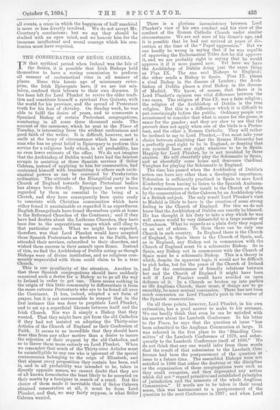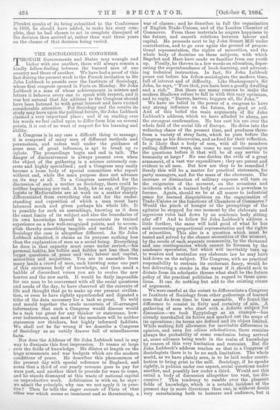THE CONSECRATION OF SENOR CAI3RERA.
IN that mythical period when Ireland was the Isle of the Saints, it is possible that Irish Bishops held themselves to have a roving commission to perform all manner of ecclesiastical rites in all manner of places. Since this heroic age of missionary enter- prise, the Irish Episcopate have, if we are not mis- taken, confined their labours to their own dioceses. It has been left for Lord Plunket to revive the older tradi- tion and constitute himself a spiritual Don Quixote, with the world for his province, and the spread of Protestant truth for his feat of chivalry. On Sunday week, he was able to fulfil the desire of years, and to consecrate a Spaniard Bishop of certain Protestant congregations, numbering in all some three thousand souls. The account of the ceremony, which he sent to the Timer of Tuesday, is interesting from the evident enthusiasm and good faith of the writer. It is difficult, however, not to smile at the irony of circumstance which has caused a man who has no great belief in Episcopacy to perform this service for a religious body which, in all probability, has an even lower estimate of the office. We do not imagine that the Archbishop of Dublin would have had the faintest scruple in assisting at these Spanish services if. Senor Cabrera, instead of applying to him for consecration, had contented himself with transmitting to others such eccle- siastical powers as can be conveyed by Presbyterian ordination. The attitude of the Evangelical party in the Church of England towards foreign Protestant bodies has always been friendly. Episcopacy has never been regarded by them as essential to the being of a Church, and they have consequently been quite ready to associate with Christian communities which have either found it unattainable or regarded it as superfluous. English Evangelicals have found themselves quite at home in the Reformed Churches of the Continent ; and if they have had doubts about the. Lutheran Churches, they have been due to the superstitious usages which still cling to that particular creed. What we might have expected, therefore, was that Lord Plunket would have accepted these Spanish Protestants as brethren in the Faith, have attended their services, subscribed to their churches, and wished them success in their assault upon Rome. Instead of this, we find the Archbishop of Dublin acting as though Bishops were of divine institution, and no religious com- munity unprovided with them could claim to be a true Church.
This is one peculiarity of the situation. Another is, that these Spanish congregations should have suddenly conceived such a desire for a. Bishop as to go all the way to Ireland in order to get one. There seems nothing in the origin of this little community to differentiate it from the more extreme Protestants who are to be found all over the Continent. It has, indeed, adopted a set form of prayer, but it is not unreasonable to suspect that in the first instance this was done to propitiate Lord Plunket, and to set up a superficial likeness between itself and the Irish Church. Nor was it simply a Bishop that they wanted. That they might have got from the old Catholics if they had not insisted on adopting the Thirty-nine Articles of the Church of England as their Confession of Faith. It seems to us incredible that they should have done this from any other motive than a desire to insure the rejection of their request by the old Catholics, and so to throw them more entirely on Lord Plunket. When we remember that much of the Thirty-nine Articles must be unintelligible to any one who is ignorant of the special controversies belonging to the reign of Elizabeth, and that almost every proposition they contain has been, and is, and in alt probability was intended to be, taken in directly opposite senses, we cannot doubt that they are of all known formularies the least likely to be accepted on their merits by a foreigner in search of a creed. But the choice of them made it inevitable that if Senor Cabrera obtained consecration at all, it must be from Lord Plunket, and that, we may fairly suppose, is what Senor Cabrera wanted. There is a glorious inconsistency between Lord Plunket's view of his own conduct and his view of the conduct of the Roman Catholic Church under similar circumstances. We are not sure of his Grace's age, and it is possible that he had not arrived at years of die- cretion at the time of the " Papal aggression." But we can hardly be wrong in saying that if he was capable of approving the Ecclesiastical Titles Act he did. approve it, and we are probably right in saying that he would approve it if it were passed now. Yet here we have the Archbishop of Dublin doing just the same thing as Pius IX. The one sent Bishops to England; the other sends a Bishop to Spain. Pius IX. places a rival Bishop in the diocese of London ; the Arch- bishop of Dublin places a rival Bishop in the diocese of Madrid. We know, of course, that there is in Lord Plunket's opinion one vital difference between the two cases. The religion of Pius IX. was a false religion ; the religion of the Archbishop of Dublin is the true religion. But this is a difference which it is difficult to put convincingly before the public. Ordinary people are accustomed. to consider that what is sauce for the goose, is sauce for the gander ; and they are slow to see that the proverb does not apply when one of the birds is a Protes- tant, and the other a Roman Catholic. They will rather be inclined to say to Lord Plunket,—You must take your choice between admitting that the Roman Hierarchy has a perfectly good right to be in England, or denying that you yourself have any right whatever to be in Spain. Happily for Lord Plunket, he is not troubled by these niceties. He will cheerfully play the Schismatic in Spain, and as cheerfully come home and denounce Cardinal Vaughan for playing the Schismatic in England. The time has passed when the Archbishop of Dublin's action can have any other than a theological importance. Toleration is sufficiently practised in Spain to save Lord Kimberley from having to listen to the Spanish Ambassa- dor's remonstrances on the insult to the Church of Spain by the consecration of Senor Cabrera by an Archbishop who is a British subject. The only result Lord Plunket's visit to Madrid is likely to have is the creation of some strong feeling in the Church of England. For this we do not know that the Archbishop of Dublin can exactly be blamed. He has thought it his duty to take a step which he was well aware would be very distasteful to a large number of Churchmen. What he regards as a, plain duty they regard as an act of schism. To them there can be only one Church in each country. In England there is the Church of England, in Spain there is the Church of Spain, and, as in England, any Bishop not in communion with the Church of England must be a schismatic Bishop. So in Spain, any Bishop not in communion with the Church of Spain must be a schismatic Bishop. This is a theory in. which, despite its apparent logic, it would not be difficult to pick holes, but for the peace of the Church of Ireland and for the continuance of friendly relations between her and the Church of England it might have been well if Lord Plunket could have avoided an open defiance of it. In a Church so broken up into parties as the Anglican Church, there must, if things are to go smoothly, be some mutual concession. There has not been much concession on Lord Plunket's part in the matter of the Spanish consecration.
On all these points, however, Lord Plunket, in his own estimation, has a good answer to make to his accusers. We can hardly think that even he can be satisfied with his answer about the Lambeth Conference. In his letter to the Timer, he says that the question at issue "has been submitted to the Anglican Communion at large. It was referred in the first place to the ' Standing Com- mittee' of the Lambeth Conference of 1878, and subse- quently to the Lambeth Conference itself of 1888." We do not think that any one would infer from these words that the result of that submission to the Lambeth Con- ference had been the postponement of the question at issue to a future time. The assembled Bishops were not satisfied in 1888 that either the doctrine or the discipline or the organisation of these congregations were such as they could recognise, and they deprecated any action which did not " regari primitive and established principles of jurisdiction and the interests of the whole Anglican. Communion." If words are to be taken in their usual sense, this was tantamount to a postponement of the question to the next Conference in 1897; and when Lord Plunket speaks of its being submitted to the Conference in 1888, he should have added, to make his story com- plete, that he had chosen to act in complete disregard of the decision then arrived at, rather than wait three years on the chance of that decision being varied.







































 Previous page
Previous page